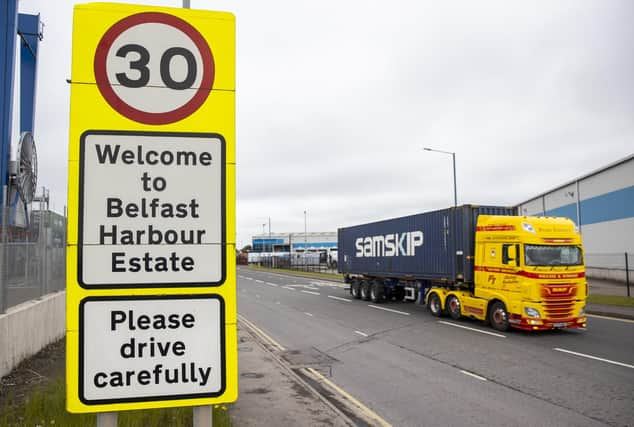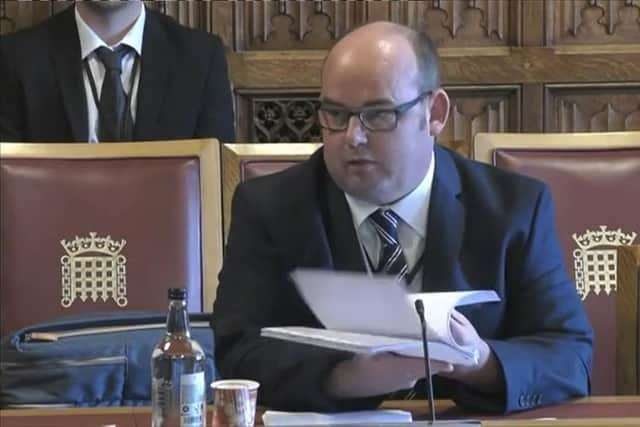Peter Summerton: Northern Ireland Protocol deal could make things worse by leading to fewer checks but more documentation


These would have exposed the significant problems caused by the attempt to apply the rules of international trade to a regional, fully integrated just-in-time supply chain as exists between Britain and Northern Ireland.
Even basic systems for common ‘groupage’ pallet movements were completely missing from the plan. At first the government sought to blame the business sector on failing to prepare but within a matter of weeks the problems were identified as inherent within the application of the protocol itself and the UK was forced to unilaterally extend the grace periods.
Advertisement
Hide AdAdvertisement
Hide AdThe UK government had got it wrong. The EU Commission had got it wrong. Through 2020 the haulage sector had repeated warnings that swathes of the protocol simply couldn’t be practically implemented but still the government decided to press on.


Even devolved government cringed at the idea that Belfast would need to do as many checks as Rotterdam.
Operating a transport business serving customers across these islands, with sites in the Republic of Ireland, Northern Ireland and a fleet of trucks moving goods back forwards across the Irish Sea, Brexit and the protocol have certainly presented technical challenges.
Food retailers moving goods from Great Britain to NI have been partially protected by the unilateral extension of the easements, reducing the bureaucratic burden and preventing the prohibitions on rest of the world meat product movements from GB to NI. Full protocol implementation on supermarkets would simply have crashed the supply chain.
Advertisement
Hide AdAdvertisement
Hide AdMoving goods across the Island of Ireland has been largely unchanged post Brexit due to the protocol. However, for those Northern Ireland traders who source their products or components from Britain the regulations are much more challenging.
Many traders, manufacturers, and processors fall outside supermarket scheme and the goods they move from Britain to Northern Ireland are by default deemed "at risk" of entering the EU. The trade is therefore subjected to some of the most complex customs and, for many foods, sanitary and phytosanitary health certification in the world, even though the items may never leave Northern Ireland.
This results in Northern Ireland being deemed as a small export market to British businesses and many have just decided, and if the arrangements are not changed will continue to decide that operating export systems just isn't worth it.
The prime minister appears to be moving closer towards reshaping the deal with the EU, there are speculative positive noises coming out of many camps but without the detail of the deal it's impossible to qualify it as a solution.
Advertisement
Hide AdAdvertisement
Hide AdAs part of a rushed Brexit deal the Protocol on Ireland/Northern Ireland was simply not subjected to logistical stress tests.
The revisions to the protocol will mean businesses bringing goods from Britain to Northern Ireland and consumers will see most change.
Over recent months the narrative from government has drastically changed from their initial green lane ideas which suggested that moving goods from Birmingham to Belfast would be as simple as moving goods from Birmingham to Glasgow. The proposals have now morphed into much more complex arrangements and the green lane has ‘Chameleoned’ from bright green to a dull pink.
It is also likely that goods which are intended to be traded on when they enter Northern Ireland will end up in the red lane. Political focus has been placed on removing checks whilst the haulage sector has screamed out that the vast majority of the problems are caused by the depth of the bureaucracy required to even get products moving in the first place at collection points, long before arrival at ports.
Advertisement
Hide AdAdvertisement
Hide AdIt is impossible to suggest that the ‘Green lane’ and ‘trusted trader’ scheme, supported by real time data will allow the supply chain to operate as would normally happen in an internal market.
But will the inevitable bureaucracy and time delays create cost burdens which will be passed onto Northern Ireland consumers and businesses?
Will even more documentation be uploaded in order to reduce the visibility of border control posts?
Will the trade friction force a realignment of supply chains to alternative sources which will inevitably be more expensive than the old?
Advertisement
Hide AdAdvertisement
Hide AdWill all meat products that are available in Britain be permitted to enter Northern Ireland?
What will happen to the GB/NI supply chain when the government schemes which are costing hundreds of millions of pounds end?
Will the small traders who move goods into Northern Ireland and who don't necessarily know the final point of consumption when the goods cross the port continue to be subjected to the requirements of international trade?
Will the EU continue to insist that declarations are required for Northern Irish produced goods being sold to Britain?
Advertisement
Hide AdAdvertisement
Hide AdSome argue that these controls were unavoidable due to Brexit, but this just doesn't stack up as trucks have not been checked moving goods from Ireland to Britain. Irish government ministers stated that delaying the controls between Ireland and Britain was good for Irish producers and UK government ministers stated it was also good for British consumers.
Surely a similar logic should have been applied to movements east to west, especially with the sensitivities of Northern Ireland. The common travel area lets our people move freely, perhaps special arrangements for goods moving around these islands should have been focused on similar principle.
My fear is that we end up with more bureaucracy and fewer checks.